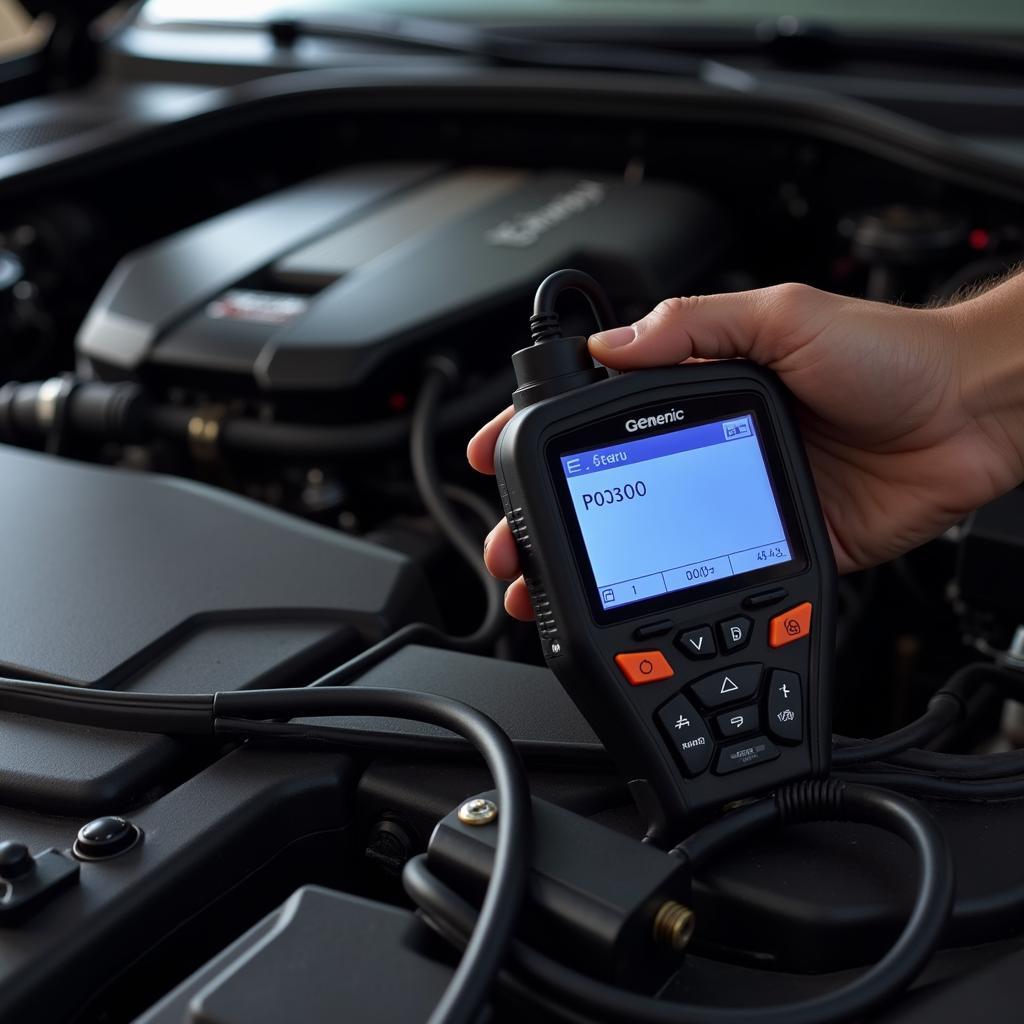A flashing check engine light and the dreaded P0300 code staring back at you from your OBD2 scanner. If you’re a BMW owner, this scenario might be all too familiar. The P0300 diagnostic trouble code specifically indicates a random or multiple cylinder misfire, a common but potentially frustrating issue. This comprehensive guide delves into the intricacies of the OBD2 P0300 code in BMWs, helping you understand its causes, symptoms, and solutions.
Deciphering the P0300 Code: What Does it Mean?
In essence, the P0300 code signifies that your BMW’s engine control unit (ECU) has detected a misfire in one or more cylinders without pinpointing the exact culprit. A misfire occurs when the air-fuel mixture in a cylinder fails to ignite properly, disrupting the engine’s combustion cycle.
What Causes a P0300 Code in BMWs?
A myriad of factors can trigger the P0300 code in your BMW. Let’s explore some of the most common culprits:
- Worn Spark Plugs: Over time, spark plugs can wear down, leading to weak sparks or inconsistent firing.
- Faulty Ignition Coils: Ignition coils provide the high voltage necessary for spark plugs to ignite the air-fuel mixture. A failing coil can disrupt this process, causing misfires.
- Vacuum Leaks: Leaks in the intake manifold or vacuum hoses can disrupt the air-fuel ratio, leading to misfires.
- Fuel System Issues: Problems with the fuel pump, fuel filter, or fuel injectors can result in inadequate fuel delivery, contributing to misfires.
- Sensor Malfunctions: Sensors like the mass airflow sensor (MAF), manifold absolute pressure sensor (MAP), or oxygen sensors play a vital role in monitoring the air-fuel mixture. A malfunctioning sensor can send incorrect data to the ECU, resulting in an improper air-fuel ratio and subsequent misfires.
Recognizing the Symptoms: How to Tell if Your BMW has a P0300 Problem
Beyond the illuminated check engine light, a P0300 code often manifests as noticeable performance issues in your BMW:
- Rough Idle: Your engine might vibrate excessively or sound uneven when idling.
- Hesitation or Stumbling: You might experience a lack of power or hesitation when accelerating.
- Reduced Fuel Economy: Misfires can lead to increased fuel consumption as your engine works less efficiently.
- Engine Knocking or Pinging: In severe cases, you might hear unusual noises from the engine, indicating potential damage.
Diagnosing the Root Cause: More Than Just a Code Reader
While an OBD2 scanner will reveal the P0300 code, pinpointing the exact cause often requires further investigation. Here’s where a systematic approach comes in handy:
-
Visual Inspection: Begin by visually inspecting the spark plugs, ignition coils, and vacuum hoses for any obvious signs of damage or wear.
-
Spark Plug and Ignition Coil Testing: Test the spark plugs and ignition coils to ensure they are functioning correctly. You can use a spark plug tester for this purpose.
-
Fuel Pressure and Delivery Check: Verify that the fuel pump is delivering adequate fuel pressure and that the fuel injectors are working properly.
-
Vacuum System Inspection: Carefully check for any leaks in the intake manifold, vacuum hoses, and related components.
-
Sensor Testing: Use a multimeter to test the functionality of the MAF sensor, MAP sensor, and oxygen sensors.
“Diagnosing the root cause of a P0300 code in a BMW often involves going beyond the surface. It requires a thorough understanding of the engine management system and meticulous testing procedures,” says Carl Stevenson, a veteran BMW mechanic with over 20 years of experience. “While some issues can be addressed with DIY solutions, more complex problems often necessitate the expertise of a qualified mechanic.”
Addressing the P0300 Code in Your BMW
Once you’ve identified the underlying cause of the P0300 code, you can take the appropriate steps to rectify the issue. Here’s a breakdown of potential solutions:
-
Spark Plug Replacement: If your spark plugs are worn or fouled, replacing them is crucial for restoring proper ignition.
-
Ignition Coil Replacement: Faulty ignition coils should be replaced to ensure consistent spark delivery to the spark plugs.
-
Vacuum Leak Repair: Repair any leaks in the intake manifold, vacuum hoses, or related components to maintain the correct air-fuel ratio.
-
Fuel System Repairs: Address any issues with the fuel pump, fuel filter, or fuel injectors to ensure adequate fuel delivery.
-
Sensor Replacement: Replace any malfunctioning sensors, such as the MAF sensor, MAP sensor, or oxygen sensors, to restore accurate data input to the ECU.
OBD2 P0300 BMW: Frequently Asked Questions
Q: Can I still drive my BMW with a P0300 code?
A: While it might be possible to drive short distances with a P0300 code, it’s not advisable. Continued driving with a misfire can lead to more severe engine damage and potentially catalytic converter failure.
Q: Is the P0300 code specific to BMWs?
A: No, the P0300 code is a generic OBD2 code, indicating a random or multiple cylinder misfire. It applies to most vehicles equipped with OBD2 systems, including BMWs.
Q: How much does it cost to fix a P0300 code in a BMW?
A: The cost of repair can vary widely depending on the underlying cause and the specific BMW model. Simple repairs like spark plug replacement might cost a few hundred dollars, while more complex issues like fuel system repairs or sensor replacements could range from several hundred to over a thousand dollars.
Need further assistance with your BMW and the P0300 code?
Contact us via WhatsApp: +1(641)206-8880 or Email: [email protected]. Our dedicated team of automotive experts is available 24/7 to provide you with personalized support and guidance. You can also find a wealth of information on our website, including specific guides for various BMW models such as:
- 2011 328i obd2
- 1998 bmw k1200rs obd2 fault codes
- list of bmw obd2 fault codes
- 2011 bmw 528i obd2 codes
- obd2 scanner e46
Remember, promptly addressing the P0300 code is essential to prevent further engine damage and ensure the optimal performance and longevity of your BMW.


